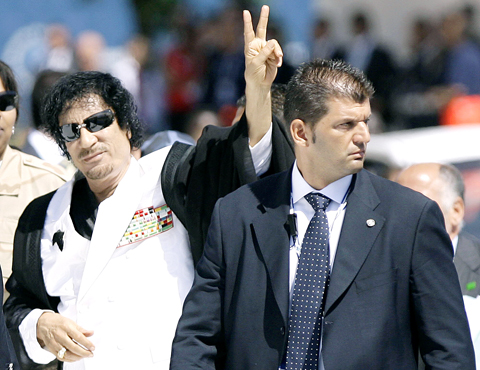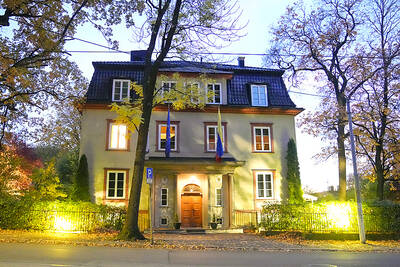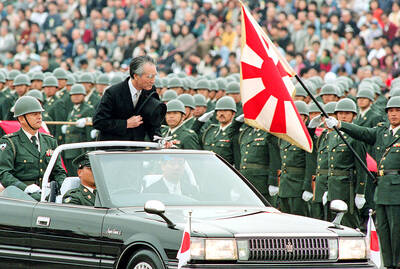G8 leaders, including an Africa-bound US President Barack Obama, vowed to stand by the world’s poor despite the downturn yesterday, unveiling a US$15 billion boost for food production.
The leaders of developed countries also heard calls from Egyptian President Hosni Mubarak to freeze repayments on loans to African countries to help them weather the economic crisis.
Mubarak, in L’Aquila as part of an expanded G8 summit, asked the rich countries to “arrange a temporary freeze on African debt” and to extend credit to the continent on preferential rates.

PHOTO: AFP
He also said they should seek the means to cover the deficit in development finance caused by the economic crisis.
Hours before making his first visit to sub-Saharan Africa as US president, Obama was expected to announce an international initiative to boost agriculture in developing countries to ensure food security.
The plan represented a “shift from food aid — which is like providing medication after the child is ill — to providing assistance to help the countries themselves to put in place the right policies to be able to produce food by themselves,” said Kanayo Nwanze, head of UN agricultural agency IFAD.
The US president called on other countries to back the plan at an expanded G8 heads of state breakfast meeting joined by the leaders of Algeria, Angola, Ethiopia, Nigeria and Senegal as well as African Union chairman Muammar Qaddafi.
The breakfast gathering focused on the effects of the world economic crisis on Africa.
The leaders expressed concern about “the growing scarcity of water resources and by the dramatic lack of sustainable access to water and sanitation in many African countries,” which they said was a major impediment to development.
In a declaration issued after the breakfast, they agreed to work for water and sanitation improvements at national and international levels.
The meeting expanded still further at a 10.30am session to include the Netherlands, Spain and Turkey, as well as the G5 emerging economies and Egypt, and the heads of the major international organizations, like the UN and World Bank.
Australia, Indonesia and South Korea were also taking part as members of the Major Economies Forum as the leaders turned their attention to food security.
The expanded meeting gave G8 leaders an opportunity to cement ties with leaders from the developing nations. Obama leaned to his right to speak at some length to Indian Prime Minister Manmohan Singh before the meeting got under way, Singh listening attentively as he looked straight ahead.
Summit chairman Silvio Berlusconi, the Italian prime minister, was flanked by Algerian President Abdelaziz Bouteflika and Turkish President Abdullah Gul, with whom he has maintained close diplomatic ties.
Berlusconi was to hold a press conference at the close of the three-day summit.
Obama and his wife Michelle were to leave for Ghana in West Africa later yesterday on the first visit to sub-Saharan Africa by a black US president.
Obama is expected to stress the interconnection between Africa and the rest of the world in the 21st century, his aides said.
Libyan leader Qaddafi held talks early yesterday with British Prime Minister Gordon Brown who told him that richer nations should not renege on their commitments just because times were getting tougher, a Downing Street spokesman said.
“The prime minister made the point that African countries were not responsible for the global recession and we have a responsibility to make sure that they are protected from it,” said the spokesman. “This is not a time to retreat from our commitments to the poorest.”
IFAD head Nwanze said that the US was to contribute US$3.5 billion to the agriculture initiative launched by Obama, which is to run over three years.
Meanwhile, hundreds of Carabinieri forces deployed along the route of a march by anti-globalization protesters towards the summit venue.
The anti-capitalist marchers were also set to tap into local frustrations about the slow progress of reconstruction after the April 6 earthquake that devastated L’Aquila, with more than 24,000 people still homeless in the area.
On Thursday, Obama said the world’s biggest economies had reached a “historic consensus” on cutting pollution, saying rich nations had a duty to set an example, as world leaders also agreed to shun protectionism.

The Venezuelan government on Monday said that it would close its embassies in Norway and Australia, and open new ones in Burkina Faso and Zimbabwe in a restructuring of its foreign service, after weeks of growing tensions with the US. The closures are part of the “strategic reassignation of resources,” Venezueland President Nicolas Maduro’s government said in a statement, adding that consular services to Venezuelans in Norway and Australia would be provided by diplomatic missions, with details to be shared in the coming days. The Norwegian Ministry of Foreign Affairs said that it had received notice of the embassy closure, but no

A missing fingertip offers a clue to Mako Nishimura’s criminal past as one of Japan’s few female yakuza, but after clawing her way out of the underworld, she now spends her days helping other retired gangsters reintegrate into society. The multibillion-dollar yakuza organized crime network has long ruled over Japan’s drug rings, illicit gambling dens and sex trade. In the past few years, the empire has started to crumble as members have dwindled and laws targeting mafia are tightened. An intensifying police crackdown has shrunk yakuza forces nationwide, with their numbers dipping below 20,000 last year for the first time since records

EXTRADITION FEARS: The legislative changes come five years after a treaty was suspended in response to the territory’s crackdown on democracy advocates Exiled Hong Kong dissidents said they fear UK government plans to restart some extraditions with the territory could put them in greater danger, adding that Hong Kong authorities would use any pretext to pursue them. An amendment to UK extradition laws was passed on Tuesday. It came more than five years after the UK and several other countries suspended extradition treaties with Hong Kong in response to a government crackdown on the democracy movement and its imposition of a National Security Law. The British Home Office said that the suspension of the treaty made all extraditions with Hong Kong impossible “even if

Former Japanese prime minister Tomiichi Murayama, best known for making a statement apologizing over World War II, died yesterday aged 101, officials said. Murayama in 1995 expressed “deep remorse” over the country’s atrocities in Asia. The statement became a benchmark for Tokyo’s subsequent apologies over World War II. “Tomiichi Murayama, the father of Japanese politics, passed away today at 11:28am at a hospital in Oita City at the age of 101,” Social Democratic Party Chairwoman Mizuho Fukushima said. Party Secretary-General Hiroyuki Takano said he had been informed that the former prime minister died of old age. In the landmark statement in August 1995, Murayama said